The "worm" body plan is a successful one. A head. Bilateral symmetry. Long body. That makes a lot of sense. The head takes the lead and you've got a long, slender body which facilitates success for moving through crevices and such. This has been thought by some to be the body plan for the very first metazoan predators (although not all with the body plan are predators).
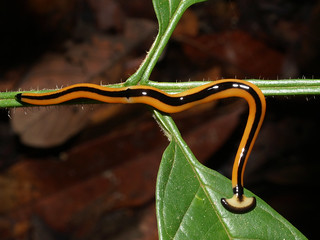 |
| Image by Divaholic |
Curiously, there's something ABOUT animals with this body shape that seems to freak people out.
Is it the body shape? Something left over from our "metazoan" brain from a LONG time ago?
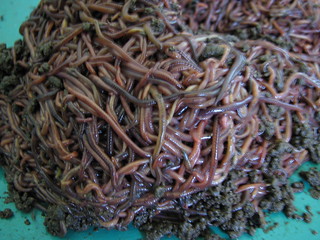 |
| Image by Mely-o |
Its Halloween week! Here's FIVE disturbing predatory worms!
Imagining ANY of these as human sized or above would be cause for alarm!
1. Bobbit Worm-Raptorial Predator!
Short version: Tropical, shallow-water predators. Up to 6 or more FEET long. They lie in wait and pounce on prey with their spring-loaded jaws. They feed on fish and other vertebrates!
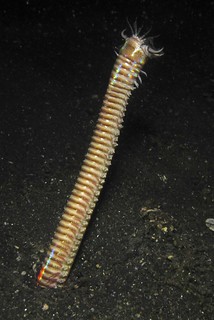 |
| Image by MerMate |
There's plenty of video... but here's a nice one...
Wanna see WORSE than the Bobbit worm?? Let's GO!
2. Ribbon Worms-Long distance Death!
Ribbon worms, also known as Nemerteans, are an obscure phylum of worms that are similar in appearance to flatworms (below) BUT one of the big differences is that Ribbon Worms possess a CRAZY long proboscis!
Basically the proboscis is an extended feeding structure used for a FAST grab which in some cases, extends easily 100% of the worms body LENGTH!
Ribbon worms really need to be seen to be appreciated. So here's some video!
A terrestrial species....
Here's a marine species devouring a FISH! Dr. Jon Norenburg, one of the world's authorities on ribbon worms breaks down what happens in this video in this NMNH No Bones Blog post!
But not all nemerteans are small, cryptic beasts. Some species, such as the Antarctic Parborlasia are HUGE. I wrote about them in this post about Weird Antarctic Invertebrates. They are upwards of THREE FEET LONG. And are about as wide around as a garden hose!
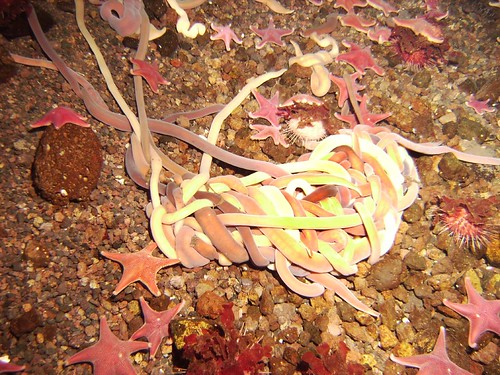 |
| Image by Icy_Sea_Slugs |
Ribbon worms are CRAZY abundant and are almost certainly important to the ecosystems they inhabit but they're often difficult to find...
3. Marine Flatworms! Eating from the inside out
 |
| Image from this website on introduced Netherlands invertebrates |
In this video, Euplana attacks a shrimp-like amphipod by wrapping around its back and completely immobilizing it. Sticking its tube-like pharynx through a segment of the amphipod, the flatworm then consumes and digests its internals--a process that takes about half an hour. Once finished, it abandons the empty carcass and goes into a resting period until its next meal. On the outside, an amphipod that's been eaten doesn't look that different from a normal amphipod...except for the fact that it's, well, dead.Videographer: Dean Janiak (Smithsonian Environmental Research Center Benthic Ecologist)
4. LAND Flatworms! Eat em' while they're alive!
Flatworms that live on the land are seen uncommonly but they're there. And they are mean, vicious predators. I wouldn't have known or even thought to think that, but here we go...
Here is Bipalium, a widely known genus of terrestrial flatworm. Originally from Asia, they've since been introduced all over the world. In their natural habitat, they have these really gorgeous, bright colors....
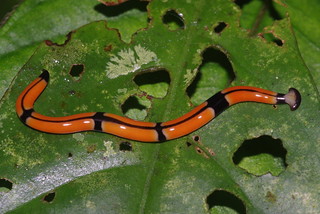 |
| image by pbertner |
Ever see an earthworm literally JUMP in sheer terror? Watch this...
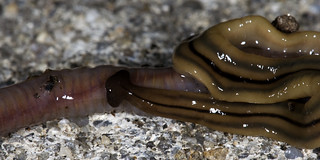 |
| Image by Amuderick |
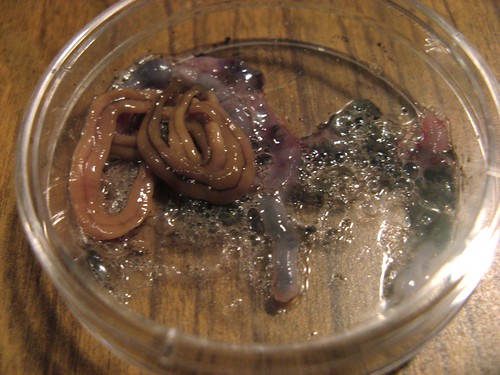 |
| Image by Cornell Fungi |
As summarized nicely in the video. No earthworms? No aeration of the soil. No crops.
Flatworms: An Invasive Flatworm Hunts Earthworms from Shape of Life on Vimeo.
5. LEECHES!
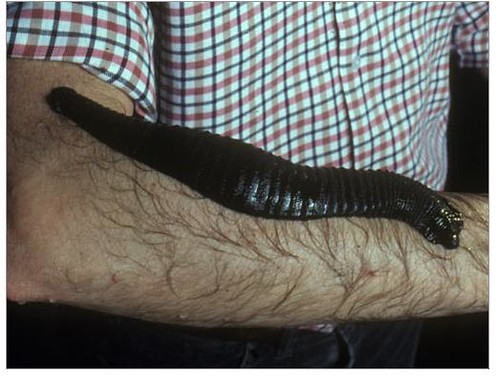 |
| Image by uezane |
While many leeches do the blood sucking thing- others are purely predatory, feeding on earthworms and other comparably sized animals. Here is a pretty amazing pic of a leech eating a tiny toad!
Here's some marine leeches! One from Lembeh, Indonesia.
 |
| Image by Christian Loader |
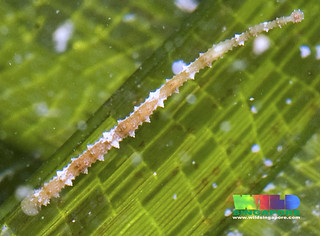 |
| Image by Ria Tan and Wild Singapore! |
When I say "whale worms" No, I don't mean, yet another post about Osedax, I mean worms that live IN the INTESTINES OF WHALES! (and other cetaceans)
 |
| thanks to Miriam for letting me borrow her pic to the Tokyo Tapeworm Museum & fr providing scale |
But that's for another day....

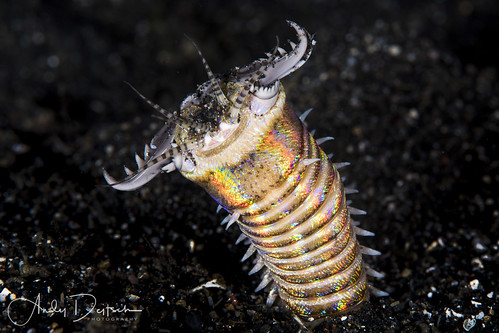
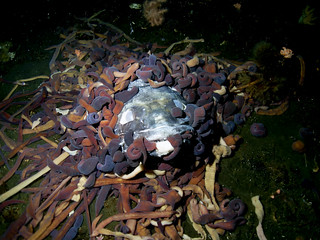
Hi Christopher, just saw this article and thought it might interest you? http://www.telegraph.co.uk/news/10389023/Secret-giant-worm-behind-mystery-of-vanishing-aquarium-fish.html
ReplyDeleteI really can't take the earthworm flatworm thing. It's like spitting all over your food until it turns into vomit and eating it. At least when flies do it they don't end up swimming in the stuff!
ReplyDeleteYou mentioned in a past blog that Parborlasia will eat sardines in tomato sauce and I know I have read the paper, but I can't for the life of me find it now. Any idea what paper it was?
ReplyDeleteI think its this one: http://onlinelibrary.wiley.com/doi/10.1029/AR039p0289/summary
ReplyDeleteits in my notes back in DC which I don't have immediate access to..
Oh my god - that Bobbit Worm is horrifying! The stuff of nightmares - and now that I've gone and watched that video I'll never be the same.
ReplyDelete